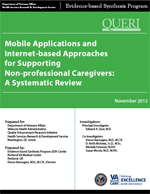
|
Principal Investigator: Edward A. Dyer, M.D.; Co-Investigators: Devan Kansagara, M.D., M.C.R.; D. Keith McInnes, Sc.D., M.Sc.; Michele Freeman, M.P.H.; Susan Woods, M.D., M.P.H. Evidence-based Synthesis Program (ESP) Center
Portland VA Medical Center
Washington (DC): Department of Veterans Affairs; November 2012 |
Download PDF: Complete Report, Executive Summary, Report, Appendices
Non-professional caregivers are an important source of physical, emotional and other support to ill or injured Veterans. With an increasing number of Veterans who require care and assistance for traumatic brain injuries (TBI), physical impairments, or other debilitating disorders such as posttraumatic stress (PTSD) and dementia, there is a greater growing demand for spouses, parents or other family members and friends to assume the role of caregiver. Electronic health applications and tools are increasingly available and have the potential to facilitate caregiving outside of traditional healthcare settings, especially in the context of the rising use of smartphones and mobile technologies. Lessons learned from prior consumer health information technology (CHIT) interventions could help inform the development of health-related mobile applications. CHIT applications are defined as electronic tools or technologies intended for use by consumers, by patients or family members, that interact directly with users for the management of their health or healthcare, and in which data, information, or other recommendations are tailored and/or individualized; the system may or may not link to a health professional or health system services. The Veterans Health Administration (VA) is currently developing mobile applications intended for use by seriously injured post-9/11 Veterans and their family caregivers enrolled in the Comprehensive Assistance for Family Caregivers program. This report was requested on behalf of the VA offices that are developing these mobile tools. The objectives of this report are the following: 1) to identify studies of CHIT applications that aim to support the needs of caregivers; 2) examine the usage and effects of CHIT applications on caregiver burden outcomes, and patient outcomes, clinical process measures, and healthcare utilization of interest; 3) discuss parallels that can be drawn from pediatric literature, and 4) identify gaps in the literature.
Key Question #1: How does the use of consumer health information technologies (CHIT) by nonprofessional caregivers of adult patients with chronic illnesses or disability, or by such patients who rely on a non-professional caregiver, affect outcomes for caregivers, patients, clinical process measures, and healthcare utilization?
Key Question #2: What lessons can be learned from studies evaluating consumer health information technologies that specifically target the parents/caregivers of children?
Key Question #3: What are the major gaps in the consumer health information technology literature serving non-professional caregivers of adult patients with regards to technology development, availability, and/or evaluation?